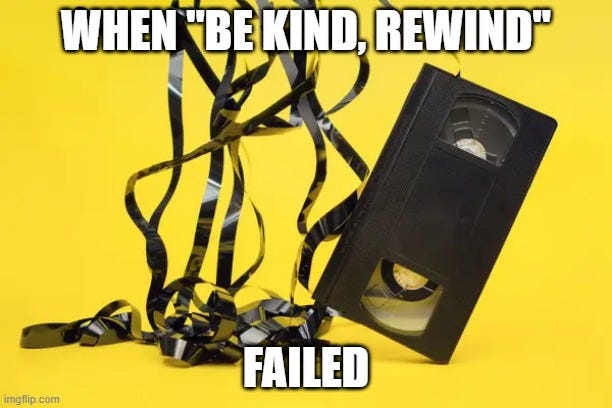Bitcoin Tech Talk #454
Interesting Stuff
Degeneracy of Pop Culture - I don’t generally pay attention to popular culture, the way that, say a high school girl does. Neither does the author, but he decided to take a look at what passes for popular these days and it’s honestly pretty frightening. The main things he identifies are the complete lack of sexual morals, to the point where teen girls celebrate someone talking about getting an STD, the complete lack of respect for life with all this talk of war, and, perhaps related, the sedation of the populace through medication, which probably act to dull the effect of the first two. What’s remarkable about these things is that such behavior and cultural values are common in hyperinflating societies.
R’s, D’s Operate Differently - This is an article that puts the trite aphorism that both parties are the same to bed. They may be to a large degree when it comes to certain policies, but the way they’re structured and how people within them gain influence is very different. As the article shows, Democrats are more a coalition of leaders of already existing groups and Republicans are more a party whose constituents are expected to show loyalty to the leader. So, though the fiat quality of both parties is obvious, the mechanism by which they operate is very different and explains why you can have Trump on the right and a Kamala Harris on the left. If you want to understand the mechanics of American politics, this is a must-read.
Rising Entropy - This is one of those ideas in physics which go against all conventional wisdom, but unreasonably keeps sticking around and makes for interesting speculation about the nature of the universe. The main idea is that gravity is not a fundamental force, per se, but the emergent behavior of entropy, or the second law of thermodynamics. There have, of course, been many different theories about gravity, positing different fundamental particles, creating singularities and hard-to-know interactions with quantum mechanics. I like theories like this better than the untestable fiat theories that academia prefers, specifically because it’s testable. We get bad science when ivory tower intellectuals are allowed to rent-seek.
The Ford Foundation Story - If you’re familiar with the robber baron era and the continuing influence the oligarchs from that era still have, you need look no further than the foundations that they set up. Or do you? The story is about the Ford Foundation and how they meddle in all kinds of cultural and political events, often generating them, and you would think that the Ford family of all people would be deeply involved. As the article shows, this is not the case and there’s a bureaucracy that’s built up over the years that have more or less taken over. I’ve seen this dynamic with a lot of charitable foundations, which attempt to last but ultimately get taken over by rent-seekers and almost get a mind of their own and it’s sad to see that it’s a common experience.
Friends - The popular sitcom from the 90’s is the subject of a deeper analysis about how sitcoms have deeply affected that generation. The most useful thing I found from the article was the idea of a “sitcom personality” or life imitating fiat art, in many ways. The hyper-reality of real people imitating fake people leads to even faker people who end up being imitated and so on. We end up with simulacrums of people rather than the real thing, which is not unlike fiat money. BTW, if you’re interested in hyper-reality, this article is one of the craziest I’ve read in a long time. I hesitate to even include it here, but there’s definitely something truly strange about the whole thing.
What I'm up to
All In Pod - I recorded this podcast 6 months ago in El Salvador, but it holds up pretty well. It was a different podcast format where we talked about libertarianism particularly through quotes and how it relates to Bitcoin. We also talked about my history and it was fun going through some significant inflection points in my life.
Seoul - There will be a meetup with the Seoul Bitcoin meetup in the first half of July. A couple of my books have been published in Korean, so it should be a good time.
Tokyo - I’ll also be in Tokyo and we’ll have some sort of meetup in the new meeting space they have there. We’re not exactly sure when that’ll be, but it’ll be in late July and we’ll have more details as the date gets closer.
Nostr Note of the Week
What I’m Promoting
Bitcoin
BitVM3 - The evolution of BitVM continues with a much smaller on-chain footprint and fraud proofs as part of this new paper. The main idea is that SNARKs (Succinct Non-interactive ARguments of Knowledge) are used rather than larger proofs to prove bad execution of the smart contract. The assertion on-chain is still 56KB, and fraud proofs are reduced to 200 bytes, but it’s not all free. There’s now a 4GB setup off-chain. But this looks like the right tradeoff, since blockchain space is expensive and off-chain validation is cheap and privatizing cost to the people that are doing the complicated thing is the fairest incentive.
Rewind Bitcoin - The idea behind this service is that you can only have a few paths out of the Bitcoin that you hold. It can’t be sent to someone arbitrarily, as in a kidnapping situation or a $5 wrench attack. If this sounds like covenants, it is! Kinda. The main idea is to use presigned transactions with a deleted private key. That way, the only way to spend the UTXO is to use one of the presigned transactions, which, if they have a locktime on them, cannot be spent until a certain time comes. If covenants people are going to argue for their functionality, more services like this popping up and becoming popular would be the best signal.
Bitcoin Research Kit - This is a visualizer of all kinds of data from your own node, so that you don’t have to go to places like mempool.space or glassnode.com to examine the data that you have locally. This is one of the more interesting projects that OpenSats has supported and hopefully, this app becomes standard on all the node-in-a-box servers and give a lot of Bitcoiners access to interesting data.
Lightning
LN for PSPs - Payment Service Providers have lucrative businesses, given enough volume. After all, they usually take a percentage of the transactions, and large volume generally means large profits. Unfortunately, the problem tends to be in settlement, which is what this article is about from Bobby Shell. Settlement is what ties up capital and across borders, require a lot of banking relationships that small and medium PSPs have a hard time getting. Lightning should change this, as the settlement part is what it’s very good at. But as with almost everything finance, things move slow, so it might take a while before these banking services are out-competed.
Lightning Communication - Lightning nodes communicating with each other is a much deeper topic than you might expect and this article goes into exactly why. There are no less than 5 different layers involved in communicating various messages between lightning nodes including obviously, routing and payment. This is a useful article to get a better mental model of Lightning and how it all comes together.
Zeus Swaps - This is a useful service to use Lightning to pay on-chain vendors and vice versa. It does cost 0.5% plus on-chain fees, but it leaves no on-chain footprint, so it’s in many practical ways it acts a lot like a confidential transaction. Of course, Zeus may be logging and a determined government may be able to access them, but it’s significantly better than a straight on-chain transaction if you want privacy.
Economics, Engineering, Etc.
Kraken Industry Survey - Apparently, most people fear themselves more than others in securing their own keys. That is, they think they’ll screw up by sending to the wrong address or misplacing private key material or something else more so than get defrauded or stolen from. The survey was given to “crypto” holders in general more so than specifically Bitcoiners, so I suspect a large part of the mistakes are in using one address for a different chain or something similar. Still, it does show that most people are simply not confident about their own abilities and in many ways don’t want the responsibility of self-sovereignty.
Blockstream App - The Bitcoin company is a little more focused these days, it seems, and at the center of their strategy is assets, consumer and enterprise, which all combine in their new app. Unsurprisingly, their products feature much in their new app, such as the Jade hardware wallet, the Liquid network and Liquid assets. This is a company that’s been in the Bitcoin space for a while now and seeing them be a bit more focused is encouraging.
GENIUS Act - We wanted a Bitcoin Strategic Reserve and we get a Stablecoin bill instead. But such is politics where disappointment is normal and betrayal, expected. There are rumblings that this is a bill that’s essentially making it expensive for stablecoin providers so that banks won’t have too much competition, which honestly wouldn’t suprise anybody. It’s still going through both Senate and House, so we don’t know what exactly will end up in the bill, but it’s quite disappointing to see.
Quick Hits
1112 BTC - This takes MetaPlanet’s treasury to 10,000 Bitcoin.
10,100 BTC - Strategy continues to acquire Bitcoin, this week more than what MetaPlanet owns in total!
Nobitex Hacked - Apparently, pro-Israel hackers took $73M from this Iranian exchange.
Trump Media Bitcoin Treasury - The SEC has approved a plan for the president’s media company to take a $2.3B treasury position in Bitcoin.
Fiat delenda est.







